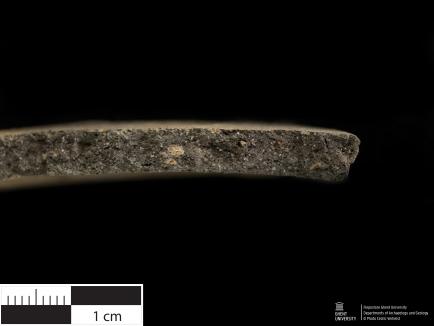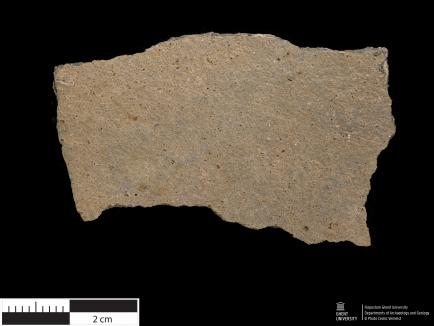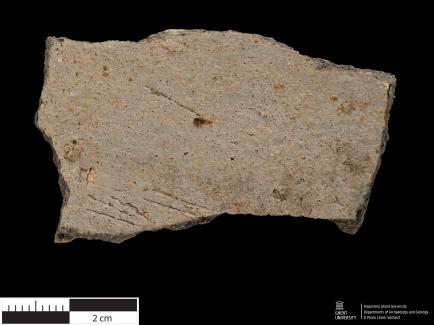Medieval - Handmade (6.HM.BE.0004)
Hand specimen pictures (macro & binocular)
Thin section pictures
Find location
- Category
- Handmade (Medieval)
- Fabric name
- Chronology
- Medieval > High Medieval > second half of the 10th - first half of the 11th century CE
- Dating method(-s)
- morphological characteristics, radiocarbon dating
- Potters' mark
- No
- Additional information
- Handmade finished on a slow wheel, production almost exclusively dominated by globular pots (to a lesser extent: spouted pots and frying pans). Based on the morphological characteristics of the pottery, the production of the small kiln at Merelbeke can be dated to the second half of the 10th and the first half of the 11th century. Radiocarbon analysis of charcoal from the kiln itself do not contradict this, although the results are ambiguous (De Groote et al. 2007).
Find location
- Site type
- Pottery production
- Location
- Belgium; Oost-Vlaanderen; Merelbeke
- Site name
- Merelbeke, Caritas
- Excavation or Survey Team
-
Wim De Clercq, Johan Deschieter and Guy De Mulder; Dienst Monumentenzorg & Cultuurpatrimonium (provincie Oost-Vlaanderen) &
Provinciaal Archeologisch Museum, site Velzeke - Additional contextual information
- Wasters found in the kiln itself (S303).
- Slip
- No
- Slip color
- Glaze
- No
- Glaze type
- Glaze color
- Glaze additives
- Additional information
- Slip
- No
- Slip color
- Glaze
- No
- Glaze type
- Glaze color
- Glaze additives
- Additional information
- Surface color
- grey
- Surface texture
- Rough
- Fracture color
- dark grey
- Inclusions (non-plastics/tempering)
- quartz tempering (0,2-03 mm), clay pellets (1-2 mm, max. 5mm)
- Matrix and voids
- /
- Diagnostic features
- Additional information
- sample MER-CAR ST2
- Flepostore inventory nr.
- ARCH1.L1.A24
- Original inventory nr.
- A0015
- Collection
- Archaeological Department, Ghent University
- Type
- Covered thin section
- Comparable thin section(s)
- Matrix
-
Reduced dark brown to black fabric; black (PPL), black (XP).
Semi-homogenous matrix, non-calcareous with no optical activity.
- ca. 50-65% - Inclusions
-
Quartz (++; mono, poly, cf: r, medium - coarse sand; ff: sr-sa, silt to very fine sand; bimodal), sedimentary rock detritus (+-; possible quartz arenite, low metamorphic rock), chert/flint (+-), muscovite mica (+-; cf: r-sr, eq; ff: el), feldspars (+; plagioclase, microcline: cf, weathering, alteration), amphibole (--; r, cf), pyroxene (--; r, cf), O/Fe (+; ff & cf), semi-plastics/clay pellets (+-; various*)
The coarse fraction varies from coarse to medium sand, the fine fraction from silt to very fine sand. Coarse fraction grains are generally rounded, fine fraction grains are generally subrounded to subangular. Bimodality, unclear if natural or added temper. Overall the fabric is very poorly sorted, poorly orientated and single spaced.
- ca. 20-30% - Voids
-
Planar voids, chanal and vughs with moderate alignment, some infill (soil?). Drying cracks in and around semi-plastics/clay pellets.
- ca. 15-20% - Diagnostic features
- The fabric is characterized by a semi-homogenous reduced matrix with no optical activity and moderately high porosity. Dominant quartz inclusions with frequent feldspars and opaques/iron oxides, common sedimentary rock detritus, chert/flint, muscovite mica and semi-plastics/clay pellets, and rare amphibole and pyroxene. Bimodality possibly from sandy clay or sandy fraction added as temper. Overall very poorly sorted.
- Additional information
- *Various semi-plastics differ in granularity, iron content, possible calcium content, presence/absence of muscovite mica. Some clay pellets are almost vitrified, some demonstrate chacracteristics of grog (well-defined inclusions, subangular, clear contrast). Same fabric as A0016 and A0017, but different firing.
- Sample type
- Pottery
- Inventory number
- 6.HM.BE.0004
- Collection
- Archaeological Department, Ghent University
- Donating institute/person
- Archeodepot, Archeocentrum Velzeke
- Host collection
- Archeodepot, Archeocentrum Velzeke
- Other samples available
- Yes
- Sample collection method
- Archaeological Excavation
De Groote et al. 2007
- Full reference
-
De Groote K., De Clercq W., Deforce K. & Moens J. 2007. Het aardewerk uit een 10de-/ vroeg 11 de-eeuwse pottenbakkersoven te Merelbeke (Oost-Vlaanderen, België). Corpus Middeleeuws Aardewerk (CMA), 18, 's Hertogenbosch.
Cite this page as: Flepostore - https://flepostore.ugent.be/ceramics/6-hm-be-0004
Last modified: 2024-04-27.






